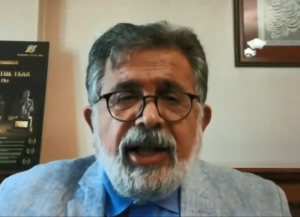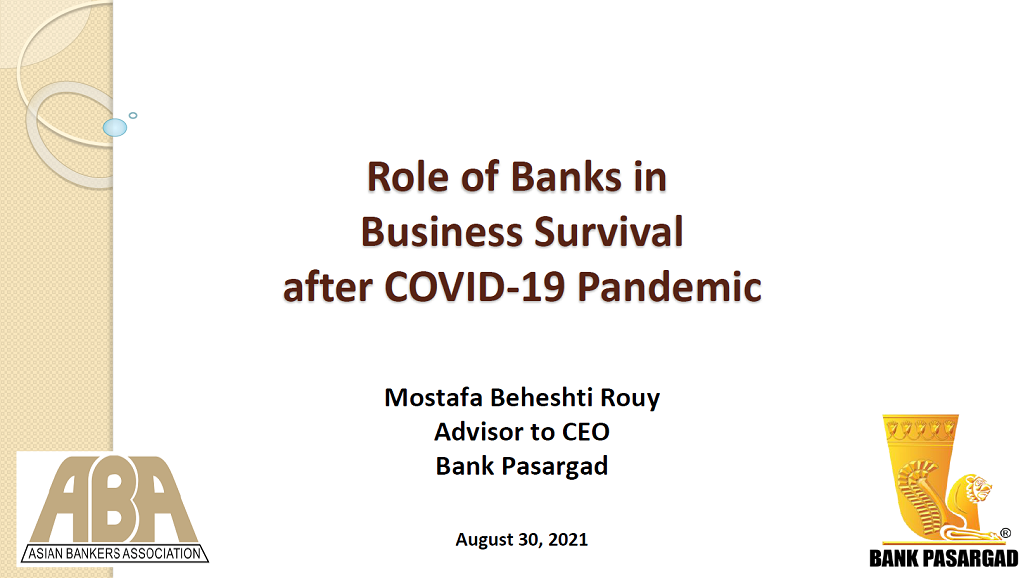Role of Banks in Business Survival after COVID-19 Pandemic
 1. Preamble
1. Preamble
Starting from late 2019, the unprecedented COVID-19 pandemic swept across the world as a devastating global public-health tragedy and economic crisis.
As COVID-19 spread across the globe, governments enacted different measures to safeguard their economies and health systems from the impact of the pandemic.
As the pandemic deepened and the economic downturn worsened, several countries faced a frightening threat to their economy and stability of their financial systems as well as extreme volatility in their stock markets.
COVID-19 pandemic has had far-reaching effects on the global economy due to globalization and spillover effects. Under these circumstances, many businesses faced with challenges and financial difficulties the likes of which they have never faced before.
The present COVID-19 pandemic is unprecedented but was expected and certainly it would not be the last pandemic to challenge the world.
Banks can play an important role in promoting the development, adoption, and implementation of high quality international standards to contain spread of the contagion, safeguard economies and assist businesses to survive and thrive in future pandemics.
2. Initial Measures & Strategies to mitigate the impact of pandemic
2.1 Measures taken by the Iranian Government
2.1.1 Partial lockdown
- The Iranian Government disregarded strict quarantine and lockdown measures on the national territory due to the fragile state of the economy.
- They principally forbidden state to state travel during Iranian New Year holidays and started gradual easing from May 2020.
- Government offices and private sector companies were never fully closed.
2.1.2 Financial Aids by Government
- Extending loans to more than 23 million vulnerable individuals & Granting financial facilities to vulnerable business sectors and households (up to 4.4 percent of GDP.)
- Cash donations to needy households (0.3 percent of GDP.)
- Government allowance to low income families.
- Aiding Unemployment Fund (0.3 percent of GDP.)
2.1.3 Budgetary Provisions
- Additional budget for Healthcare Sector (2 percent of GDP.)
- Withdrawal from National Development Fund up to USD 1 billion to fund COVID-19 aids.
- Extending payment of tax deadlines to the government by 3-months (up to 7 percent of GDP.
- Selling of government owned remaining share in some public companies for additional COVID-19 aids.
2.2 Measures taken by the Iranian Banking Sector
2.2.1 Actions for decreasing banking staff presence at work
- Reducing daily working hours for all staff to half-day for 2-months.
- Reducing mandatory employee attendance to 50% and gradually returning to full staff on May 23, 2020 through a phase by phase approach as per guidelines of the Iranian National COVID-19 Supreme Committee.
2.2.2 Promoting Digitalization
- Increasing ceiling on fund transfer by bank cards.
- Enhancing and promoting Digital and Mobile Banking with all clients of the bank.
- The banking sector has extended on-line payment gateways.
2.2.3 Providing Financial Facilities to SMEs
- Accommodating and assisting clients and business owners (specially SMEs) in repayment of financial facilities by postponing repayment of loans up to 3 months, waiving their penalties and providing low rate financial facilities as working capital for them.
- Providing financial facilities to 30 million low-income individuals.
- Temporary lifting of restrictions with regards to bad checks for 3-months.
2.2.4 Assistance to the banks’ commercial clients regarding Exports, Imports and Letters of Credits
- Extending time table for return of proceeds from exports by 3-months.
- Extending time table for importation of goods under issued foreign currency allocations prior to February 2020 by 3-months.
- Extending repayment of foreign currency loan installments due on March, April, May and June 2020 by 3-months.
- Opening deferred payment domestic letters of credit in Iranian Rials in order to extend non-cash credit to companies working within the national supply chain process.
3. Measures to recovery
3.1 Gradual lifting of lockdown
- Faced with the challenges and fragility of the Iranian economy, the Iranian government chose to never implement a total lockdown.
- Many professions and production facilities employing a large number of employees in closed environments were required to obtain a license from Iranian Ministry of Health and conduct regular testing.
3.2 Introducing public health protocols
- Iran has decided to implement Smart Distancing, which is in line with social distancing and provided conditions for society to gradually return to normal.
- Informing and educating people on the Covid-19 virus and preventive measures via public media.
- Development of executive instructions for the Covid-19 Care System.
- Emphasizing on using medical devices such as surgical masks, gloves and disinfectant liquids
- Obligation for utilization of face masks in public places.
3.3 Introducing workplace health requirements
- Reduction of working hours, working in separate shifts & working from distance.
- Developing recommendations for each workplace category.
- Special disinfection instructions for service personnel in workplaces.
- Exempting physical presence of employees belonging to vulnerable groups.
3.4 Developing guidelines for reducing disease transmission at work places
- Encouraging sick employees to stay home.
- Separation of sick employees.
- Protecting employees at high risk such as pregnant women and people with underlying medical conditions.
- Criteria for Return to Work for infected employees.
3.5 Publishing guidelines for Social Distancing and Environmental and Workplace Health Requirements in Banks
- Obligation for utilization of mask and gloves by all employees and clients.
- Testing of body temperature of all staff and clients prior to entering premises.
- Installing of glass separation between staff and clients in all branches.
- Educating and encouraging clients for maximum usage of electronic and mobile banking services and apps.
- Increasing ceiling on fund transfer by bank cards.
3.6 Financial & Budgetary Instruments
- Publishing of Islamic Bonds and Sukuks.
- Government aims to reduce budget deficit during 2020.
- Government allowance to low income families.
- Granting financial facilities to vulnerable business sectors and households (up to 4.4 percent of GDP.)
4. Covid-19 Risk assessment at Bank Pasargad
4.1 Assessment of health conditions and financial stability of the bank and its clients
- Continuous assessment of the health and medical conditions of all management and staff.
- Continuous surveillance on financial health and stability of clients, industries and borrowers.
- Analysis on different business lines and revenues of the bank.
- Continuous surveillance of liquidity, cash flow and revenues of the bank.
- Constant monitoring of financial facilities granted and NPL of the bank.
- Regular comparison of data with those of previous years.
4.2 Permanent measures undertaken by the bank during crisis include
4.2.1 General Health & Medical preparations for customers and staff
- Informing and educating employees on the Covid-19 virus and preventive measures.
- Distribution of medical devices such as surgical masks, gloves and disinfectant liquids amongst all management and staff.
- Obligation for utilization of mask and gloves by all employees and clients.
- Installing of glass separation between staff and clients in all branches.
- Regular and random coronavirus testing of all staff.
- Testing of body temperature of all staff every morning prior to entering premises.
- Testing of body temperature of clients prior to entering Bank Pasargad Head Office building.
4.2.2 Reducing physical presence of employees
- Reducing of working hours, working in separate shifts, working from distance, and taking of other appropriate measures for management and staff.
- Limiting of open branches in each state during crisis based on client demand and requirements.
- Exempting physical presence of staff belonging to vulnerable groups.
- Strict observation of “Social Distancing” protocols.
4.2.3 Digital solutions
- Organizing meetings via video-conferencing.
- Educating and encouraging clients for maximum usage of electronic and mobile banking services and apps.
- Augmenting capabilities of ATMs at 26 branches in accepting cash deposits (other branches in progress).
- Increasing ceiling on fund transfer by bank cards.
4.2.4 Medical Emergency solutions for infected staff
- Establishing of full time medical team at Head Office premises and providing emergency supplies and medical equipment and even 3 ambulances to provide fast response medical care to needy patient staff.
- Online issuing of introduction letters for all staff to hospitals and medical clinics.
- Clearance permission by a medical doctor in case of those employees infected by the coronavirus.
5. Policies & Actions due to Covid-19 Pandemic at Bank Pasargad
5.1 Liquidity management and Identification of potential risks
- Identification, appraisal and categorizing potential risks endangering the bank.
- Enhancing and improving management of assets and liabilities in the bank and further strengthening ALCO.
- Improving and emphasizing management of liquidity.
- Increasing liquidity in the bank and converting certain assets to cash and liquid assets.
- Preference of investment in short-term projects.
5.2 Management of the bank’s credit portfolio
- Upgrading the average rating of bank’s Credit Portfolio by increasing supervision of consumption of loans by clients.
- Facilitating repayment of loans and financial facilities for vulnerable economic sectors due to COVID-19 pandemic.
- Preference for short-term lending and financial facilities.
5.3 Credit Facilities granted by Bank Pasargad to various economic sectors
- The bank initiated a plan to support low-income tenants. Started from August 26, 2020, we reviewed 2,678 requests and granted IRR 901 billion of “Housing Deposit Facilities”.
- Bank Pasargad extended loan settlement period of the banking debtors due to the difficulties imposed by Corona virus pandemic. Furthermore, in order to boost production and facilitate the settlement of non-current debt of producers, if the borrowers choose to settle their debt in cash, the bank removed all penalties.
- Due to the outbreak of coronavirus and the problems risen for small businesses for repayment of their loans, the bank accepted to postpone facilities’ due dates by a simple online request.
5.4 Credit Facilities granted by Bank Pasargad to SMEs
- In FYE 2021, despite the Covid-19 pandemic, the total facilities granted by Bank Pasargd to SMEs grew by 166.7% in comparison to year 2020.
- Approximately 93% of total facilities granted during FYE 2020-2021 (Iranian Year 1399) was granted to SME legal entities and 7% to real person SMEs.
- Bank Pasargad has continuously supported corona-affected businesses by granting low-interest credit facilities to the applicants.
- In order to promote the Iranian national economic development, Bank Pasargad introduced many new financial and credit products in 2020.
- In order to better support manufacturing and production companies, the bank introduced a new product to enhance the working capital for credit clients.
5.5 Bank Pasargad assisting vulnerable economic sectors
- Structured use of “validation result” in the credit decision process.
- Paying attention to “customer credit capacity” and “customer relations” in credit decision making.
- Determining the optimal credit portfolio of the bank, including micro and macro, installments and lump sums, credit risk, contracts, etc.
- Determining specific criteria in credit conclusion, including the development of “collateral determination criteria” based on the “validation result” and “credit capacity” of the applicant.
- Development and implementation of mechanisms and important instructions of the Central Bank, such as instructions on “how to defer facilities”, “prevent the accumulation of non-current receivables”, “how to identify revenues”, etc.
- Establishment of a joint working group with the relevant units in order to remove the obstacles to the implementation of the ICO accreditation system and the connection of the mentioned system to the Pasargad Core banking system.
- Redesign of the Financial Services Company as the main accreditation company in the bank.
6. Business transition towards digitalization
6.1 More support and focus on information technology
- Applying AI (Artificial Intelligence) in banking activities as a strategic Information technology.
- Increasing research and development on fields of IT and communication and further investments in digital solutions.
- Supporting IT and digital businesses.
- Further concentration on cyber Security and safeguarding of client information.
6.2 Encouraging employees and customers to use online services
- Augmenting to the extent possible different businesses of the bank (such as procurement) towards online platforms and digital solutions.
- Enhancing digital and online services offered by the bank.
- Improving electronic payment channels including Electronic Wallet and Face Recognition Systems.
- Introducing new channels for payment such as “PayPod” which is the enhanced version of Bank Pasargad E-Wallet previously released under the name “Kipod”, aiming to revolutionize clients’ daily retail payments.
- Establishing safe networks on the national internet infrastructure.
6.3 Reducing the need for physical meetings of clients and employees
- Enhancing and promoting both financial and social applications with objective of minimizing physical meeting with clients.
- All internal meetings as well as the General Assembly Meetings were held virtually.
- Organizing most internal and meetings with clients via video-conferencing or different applications.
- Aiming to lower time required for each task.
- Minimizing the wait of clients at the branch.
- Altering KYC and Credit Assessment procedure to be conducted digitally without necessity for face to face meetings with clients.
The presentation file can be downloaded HERE.
The video recording of ABA Policy Advocacy Committee Meeting can be viewed in the ABA YouTube.
Prepared for the Asian Bankers Association by:
 Mr. Mostafa Beheshti Rouy
Mr. Mostafa Beheshti Rouy
Member of Board of Directors
Bank Pasargad

